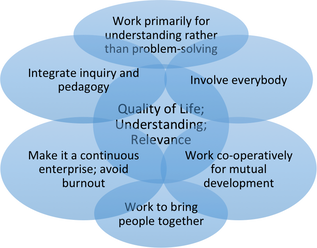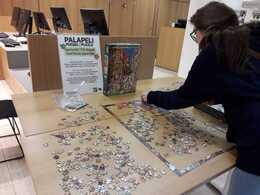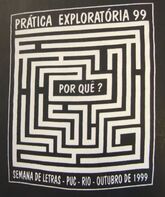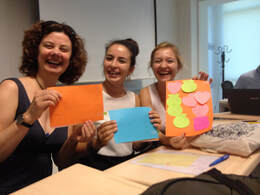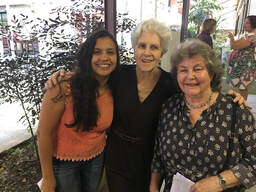|
Learners as
'key developing practitioners' |
Learners are both unique individuals and social beings
who are capable of taking learning seriously, of taking independent decisions, and of developing as practitioners of learning. (Allwright & Hanks 2009: 15)
|
|
Definition
|
Exploratory Practice is an indefinitely sustainable way
for classroom language teachers and learners, while getting on with their learning and teaching, to develop their own understandings of life in the language classroom. It is essentially a way for teachers and learners to work together to understand aspects of their classroom practice that puzzle them through the use of normal pedagogic procedures (standard monitoring, teaching, and learning activities) as investigative tools. (Allwright, Hanks, Miller, Samson, & Wu, 2001, in the original EP website)
(as cited in Hanks 2017: 83) |
|
Puzzles
|
Definitions of 'puzzles' contrasted with 'problems'
(Hanks 2017: 125) Problem: Connotative language is used to express negative emotion, for example irritation, fear, distrust, or frustration. An expression of the ISness of things, showing evidence of unwillingness to investigate further because questions are closed down or blocked with easy explanations (eg 'Well, just give the learners lots of spellings to learn week-by-week, test them regularly, and they will learn' or 'I can tell your learners how to activate their vocabulary! Just do x, y, z.'). Puzzle(ment): Often combined with an expression of surprise or interest. An articulation of the positive uncertainty of things, implying a willingness to investigate further, and to develop deeper understandings of the issue at hand. These understandings may be partial or incomplete, and they may raise further questions, but this is seen as a good thing, something to be celebrated as part of the uncertainty and complexity of life. |
|
PEPAs
|
Potentially Exploitable Pedagogic Activities (PEPAs)
'slightly adapted pedagogic activities that teachers and learners are familiar with […] tools to involve practitioners in the reflexive process' (Moraes Bezerra & Miller 2015: 105)
|
References |
|
